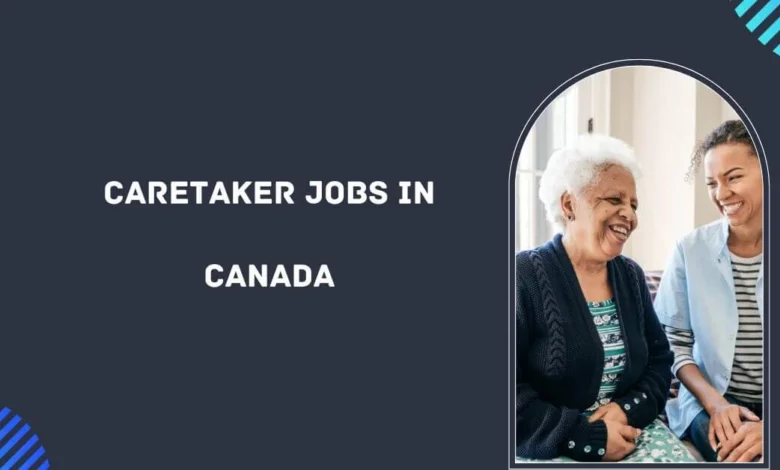Caretaker Jobs in Canada 2024 – Apply Now

By adhering to anti-oppression and anti-discrimination practices, YWCA Toronto ensures that the rights of every individual are safeguarded and respected. Our objective is to foster an environment that is inclusive and supportive of women and people who identify as transgender, intersex, non-binary, agender, or two-spirit.
Applications from women and gender-diverse individuals of all colors, ethnicities, religions, abilities, and sexual orientations are strongly encouraged. The caretaker is accountable for the ongoing maintenance, minor restorations, and general upkeep of 1st Stop Woodlawn and Bongard House.
Check Also: Live-in Caregiver Jobs in Canada with Work Permit 2024
Details of Caretaker Jobs in Canada
- Employment Type: Full-Time, Permanent
- Work Hours: 35 hours per week
- Company: YWCA
- Salary: $42,219 annually (L2), plus comprehensive benefits
- Location: 80 Woodlawn Avenue East, Toronto, Ontario, M4T 1C1
About YWCA Toronto
The mission of the YWCA Toronto is to better the lives of girls, women, and people of diverse genders. Our initiatives advocate for economic security, equality, and the eradication of violence. We assist gender-diverse individuals, including women and youth, in escaping violence, securing housing, securing employment, giving a voice, developing skills, and gaining confidence. We provide housing alternatives, programs for training and employment, initiatives for community support, programs for young women, and programs for families. We participate in systemic advocacy as well.
Benefits of Caretaker Jobs in Canada
- Satisfaction at Work: Because they directly contribute to enhancing the quality of life and well-being of those they care for, many people derive immense gratification from their roles as caregivers. Having a positive impact on another person’s existence can be extremely satisfying.
- Personal Relationship: Typically, caregivers develop deep and meaningful relationships with those they care for. This intimate relationship can foster a sense of companionship and belonging to a supportive community.
- Alternative work schedules: Frequently, roles as a caretaker offer flexible schedules, which may appeal to those who must balance work with other obligations, such as family or education.
- Strong Demand: It is anticipated that the demand for caregivers will increase due to the aging of populations in many nations and the rising demand for healthcare services. This indicates that there are typically numerous employment opportunities in this discipline.
- Emotional Benefits: Caretakers have the opportunity to provide emotional support and comfort to individuals confronting challenging circumstances. Offering compassion and empathy can be extremely rewarding.
- Diverse work environments: In addition to hospitals, nursing homes, private homes, assisted living facilities, and hospices, a variety of other locations offer opportunities for caretaker employment. This diversity enables caregivers to select an environment that best accommodates their preferences and abilities.
- Ability Improvement: A variety of talents, including communication, problem-solving, patience, and adaptability, are required for caregiving positions. These skills are not only valuable in the field of caregiving, but they are also transferable to other fields.
- Career Advancement: Caretakers can pursue opportunities for career advancement, such as becoming certified nursing assistants (CNAs) or licensed practical nurses (LPNs), which can lead to higher-paying positions with greater responsibilities.
- The stability of: As the need for care services persists regardless of economic conditions, healthcare and caregiving are typically considered stable industries.
- Instruction and Instruction: Numerous employers provide training and educational opportunities to help caregivers enhance their skills and remain current on the best healthcare and caregiving practices.
- Healthcare Advantages: Some caretaker positions include medical, dental, and vision insurance coverage, which can be advantageous for caretakers and their families.
- Diverse Job Functions: There are numerous types of caretaker jobs, including home health aides, personal care assistants, hospice employees, and nursing assistants. This diversity allows individuals to select a position that matches their interests and skills.
Responsibilities of Caretaker Jobs in Canada
- In charge of minor repairs and general maintenance in all areas of the structure and its apparatus, including minor carpentry, plumbing, electrical work, and painting;
- In charge of unit rollovers, which include painting, cleaning, and maintenance;
- Ensures that cleaning and other building tools and equipment are in proper functioning condition; notifies the manager of any required repairs;
- assesses the fire panel by conducting tests on the emergency generator, fire pump, and all egress doors;
- Daily verification that the temperature and pressure of the refrigeration units, food-handling units, and chilling water supply are accurately maintained;
- As required, relocate equipment, supplies, and furniture;
- Janitorial responsibilities, including some trash, recycling, and refuse removal and disposal;
- Inventory management for maintenance supplies and equipment;
- supervises all roadways and parking areas to ensure that fire routes are accessible and unobstructed;
- ensures the presence and proper utilization of safety supplies, equipment, tools, and materials on the premises.
- conducts all duties by WHMIS and WSIB standards and attends required health and safety training.
- guarantees compliance with all building codes and legal requirements;
- ensures compliance with health and safety protocols by YWCA Toronto’s policies and procedures.
Qualifications for Caretaker Jobs in Canada
- A high school general education supplemented with technical training in building maintenance, plumbing, or electrical systems (equivalent credit will be granted in certain circumstances);
- 3 to 5 years of relevant experience;
- physically capable of withstanding prolonged periods of physical exertion, including frequent periods of standing, bending, or lifting; capable of lifting 25 kilograms;
- Expertise in repair technology and methodologies, encompassing carpentry, drywall installation, and basic plumbing;
- knowledge of the use of cleansing products;
- Possessing practical knowledge of operating buffers, steam cleaners, power washing equipment, wet and dry vacuums, floor strippers, and additional machinery, including snow blowers and garbage machinery;
- Fundamental computer skills, including Dayforce entry, inventory management, and email and internet usage;
- Proficient operation of a computerized maintenance management system;
- WHMIS accreditation;
- completing the training on Toronto shelter standards;
- Work experience in a residential environment;
- Capability to interact professionally and with courtesy with a diverse community of young women and women in shelter and housing settings;
- Possession of a legitimate driver’s license for Ontario and access to a motor vehicle are assets.
YWCA Toronto alters lives. We assist gender-diverse individuals and women in the city, as the largest multi-service women’s organization, in escaping violence, escaping poverty, and gaining access to secure, affordable housing. We strive tirelessly to eliminate obstacles that prevent women and individuals who identify as gender diverse from attaining parity.
Vaccination Policy: All YWCA Toronto employees, students, and volunteers are strongly encouraged to obtain all COVID-19 vaccinations and supplemental doses as recommended by Toronto Public Health, by the YWCA Toronto COVID-19 Vaccination Policy.
Before being hired, the successful candidate is obligated to undergo a vulnerable sector police reference check. Anti-oppression principles are advocated for and the tenets of the Ontario Human Rights Code are upheld by YWCA Toronto. Applications from women and gender-diverse individuals of all colors, ethnicities, religions, abilities, and sexual orientations are strongly encouraged.
YWCA Toronto offers accommodations to applicants with disabilities throughout the entire hiring process, upon request. If contacted, kindly inform us if any accommodations are necessary. Although all applicants are appreciated for their interest, communication will be limited to those who have been invited for an interview. The workplace at YWCA Toronto is scent-sensitive.
For More Info:
Email Your CV, and We’ll Find the Best Pathway For you: info@caregiverjobswithvisa.com
Frequently Asked Questions:
-
What is the job of a caretaker?
A caretaker makes sure a building and its grounds are secure and in good condition at all times. They care for key buildings in their communities, including schools, flats, community centers, gyms, and shopping centers.
-
Is being a caretaker an occupation?
A caretaker, janitor, or site manager takes care of the security and maintenance of community buildings. Their duties include cleaning, performing simple repairs and maintenance tasks, and performing security checks for the buildings in their care.
-
How much does a caretaker make in Canada?
The average caretaker salary in Canada is $39,784 per year or $20.40 per hour. Entry-level positions start at $35,100 per year, while most experienced workers make up to $46,919 per year.



